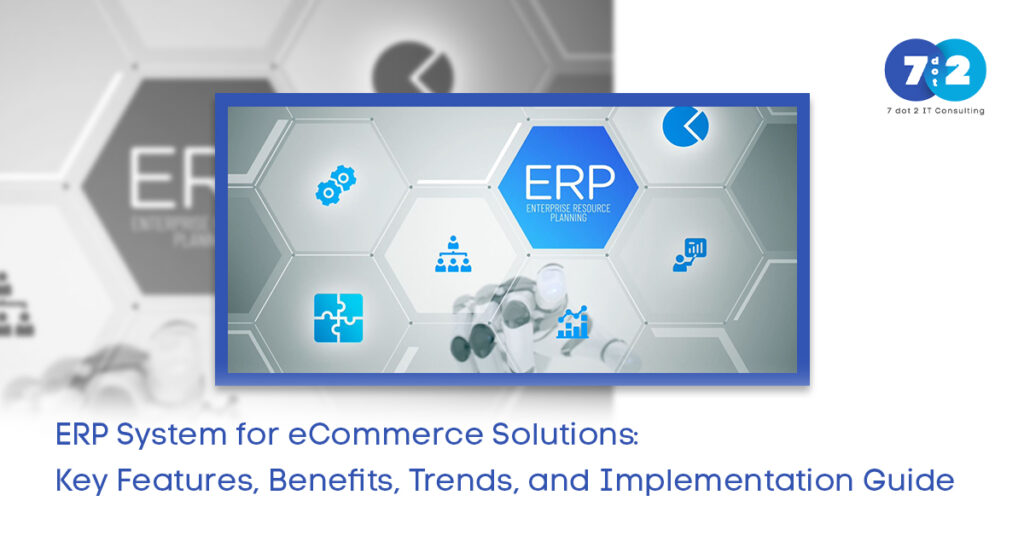ERP System for eCommerce Solutions: Key Features, Benefits, Trends, and Implementation Guide
Posted on : 01 Aug 2025 at 17:29 pm, by Puneet Aggarwal, Founder 7 dot 2 IT Consulting

In an increasingly digital-first environment, organisations focused on e-commerce are under relentless pressure to produce strong outcomes at speed, with accuracy, and with an exceptional customer experience. Complexity and inefficiency grow every time a member of the team must service the key tasks around order, inventory, shipping, payments, or the financial aspect of every transaction, which may be across different platforms. An enterprise resource planning (ERP) system for e-commerce can be an important part of the solution to these ongoing challenges.
At 7 dot 2 IT Consulting, we work with organisations to implement ERP, which has been shown to enable organisations to shorten operation time, streamline processes, manage costs, and grow with confidence. In this blog post, we will further expand on what ERP means for eCommerce, some of the key features and benefits, some of the key trends, and what a strong deployment looks like.
What is ERP in e-commerce?
ERP (enterprise resource planning) in eCommerce is the integration of back-end operations (e.g., inventory, finance, supply chain, and order management systems) with the front-end, and online sales and customer service. ERP creates a dynamic system of all of the components working together, rather than through siloed systems and components.
For instance, when a customer purchases a product online, the ERP can automatically adjust the change in inventory, automatically notify the warehouse to ship the product just purchased, backward post the transaction in accounting, and update the customer, who may be useful in future marketing – and all without having to worry about manual entry, with a high level of accuracy and a high level of speed.
How are ERP and eCommerce related?
E-commerce thrives on speed and transparency; ERP provides both. For example, think of a fashion retailer:
- A customer orders a jacket online.
- With eCommerce integrated into the ERP, the ERP can update the available inventory, showing one less jacket available, notify the warehouse to ship the jacket, debit the customer’s credit card for the jacket, and update the customer’s data – all while processing the same overall transaction.
- Without ERP, these steps often require manual updates, leading to errors, overselling, or shipping delays.
This seamless synchronisation is the reason ERP has become the backbone of modern eCommerce.
Core ERP Features Every eCommerce Brand Needs
While considering the best ERP for eCommerce, prioritise features that have a direct response to business issues:
1) Simplified Order Management – Automates the process from purchase through delivery to minimise human error and accelerate fulfilment.
2) Enhanced Inventory Control – Offers real-time visibility into inventory levels, avoids overselling, and allows for better forecasting of demand.
3) Efficient Financial Processes – Streamlines accounting with automated payment reconciliation, compliance-ready reporting, and automated invoicing.
4) Customer Data Management – Centralises customers’ data for targeted marketing and enhanced service.
5) Analytics & Reporting – Provides visibility into sales, supply chain effectiveness, and customer behaviour – enabling wiser decisions.
Best ERP for eCommerce: What to Look For
The best ERP for e-commerce is determined by company size, objective, and complexity. Keep an eye out for:
- Smooth integration with Shopify, Magento, WooCommerce, or Amazon.
- Scalability to cater to growth and expansion.
- Remote accessibility via mobile for management.
- Multi-currency and multi-language capabilities for going global.
Best-in-class platforms such as SAP, NetSuite, Odoo, and Microsoft Dynamics 365 excel in terms of strong capabilities and flexibility. Through 7 dot 2 IT Consulting, we assist organisations in choosing and implementing the best-fit ERP that best suits their industry and growth level.
Benefits of ERP-Integrated eCommerce
The benefits of ERP-integrated eCommerce reach all areas of the business:
- Operational Efficiency – Automated processes reduce manual steps.
- Cost Optimisation – Improved inventory planning lowers holding costs and stockouts.
- Customer Satisfaction – On-time orders and quicker deliveries build confidence.
- Data-Driven Growth – Unified data drives improved decision-making in marketing, sales, and finance.
New Trends in ERP for eCommerce
ERP technology evolves along with digital transformation. Some emerging trends in ERP are:
- AI-powered forecasting to optimise demand and supply chain.
- Cloud-based ERP for cost, scalability, and accessibility.
- Mobile ERP that enables managers to work anytime, anywhere.
- IoT integration connecting ERP with intelligent logistics and warehouse systems.
- Personalised experiences leveraging ERP data to personalise offers and recommendations.
These advances make ERP not only a back-office product but also a force driving customer interaction and competitive edge.
Implementation Guide: How to Get ERP Right for eCommerce
Implementing ERP is a strategic investment. Here’s how 7 dot 2 IT Consulting helps organizations succeed:
1. Assessment of Pain Points – Pinpoint issues such as delayed orders, incorrect stock, or discrepancies in finance.
2. ERP Selection – Suggest the appropriate ERP solution based on your business size and future aspirations.
3. Integration Planning – Ensure smooth compatibility with your eCommerce platform.
4. User Training – Provide teams with hands-on training for adoption and productivity.
5. Phased Rollout – Roll out in phases to minimise risks and maximise ROI.
Conclusion
For eCommerce companies, ERP is no longer a choice—it’s the key to growth and survival. From streamlined order management to optimised financial processes, ERP introduces the framework and intelligence needed to compete in a competitive industry.
At 7 dot 2 IT Consulting, we can craft and deploy ERP solutions tailored to your specific business requirements. Whether you’re growing a startup or overhauling an enterprise, the optimal ERP for eCommerce can convert operational issues into roads to sustainable success.
Are you ready to leverage the full power of ERP for your e-commerce company? Contact 7 dot 2 IT Consulting now to begin your transformation process.
